Of People and Walls
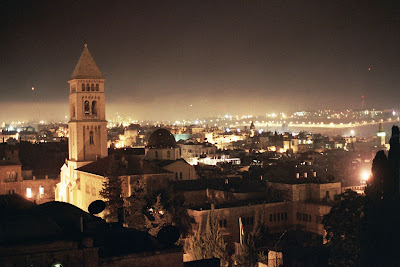 |
| Jerusalem skyline at night |
"Jerusalem... Zion... It's the place where God will create peace on Earth."
I had bumped into the man on a street corner in Tel Aviv at night. He was moving his things and I asked if he needed help. As we walked, I started wondering what sort of life he lived that his possessions seemed to include only the guitar slung over his back, a plastic bag full of unknown items, and a flat-screen monitor. But our walk was brief and didn't allow me to ask more than where he was moving and why.
"I will go there. It's... it's... a city in conflict. Jerusalem... She needs help."
The funny thing about the "city in conflict" is that it would be easy to visit and not realise the tension that exists. When I went up to the roof of my hostel in Jerusalem to set out my mattress in preparation for a sleep under the stars at night, I was surrounded by the solemn sound of calls to prayer issuing from mosques on all sides. There were 7 or 8 of them, each with their own plaintive melody. The music of Islam was traded for the churchbells of Christianity the next morning, slightly less welcome if only for waking me up at the crack of dawn following a late night out in bars and clubs.
| Jews praying at the Western Wall, Jerusalem |
The view from the roof was beautiful — it was possible to take in a panorama of the old city, rooftops interspersed with minarets, church steeples, and the Dome of the Rock. What I didn't see were the views people hold inside that cause conflict. I didn't see the walls people build around themselves to stop opposing opinions entering their space. I didn't see the wall dividing Israel from Palestine, over a hill and out of sight. These were the surprises hidden amongst the beautiful visuals of Jerusalem. They revealed themselves only after the city had bared its ancient white stone buildings and Roman ruins to my eyes.
"Jerusalem is the most international and least cosmopolitan city in the world," said an Israeli I met at a party there. People from all over the world come but nobody mixes, he explained.
I told a young woman who had come on a Birthright trip to Israel that I was planning to take a guided tour to Hebron, in the West Bank. It was clear from her reaction just how worthless an endeavour she considered it to be.
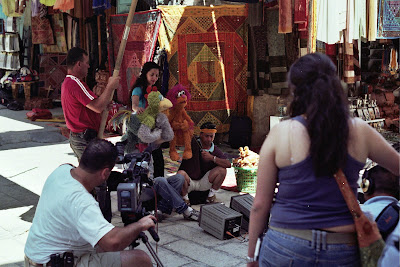 |
| Filming what is presumably Sesame Street Israel on the streets of the Old City in Jerusalem |
"What's the name of the guide?" she asked.
"Abu Hassam."
"Right," she said, revealing what she thought of the fact that he was Arab with her expression. "They like to make up facts, you know."
The comment was a brilliantly easy way of disregarding anything that didn't fit her worldview: anyone with a different perspective was a liar. Not only did this stop any potential exchange of ideas, her attitude frustrated me so much it stopped me from telling her about my previous visit to Ramallah, also in the West Bank, with a Palestinian journalist.
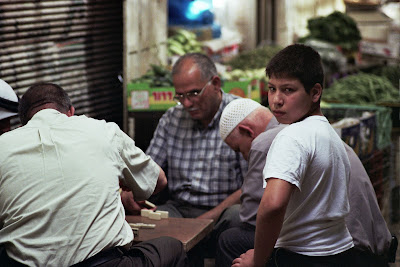 |
| Men playing dominoes in the Jewish Quarter, Old City in Jerusalem |
On that excursion, crossing into Palestine and looking back over my shoulder at the tall concrete barrier dividing the land, I found it was no longer referred to as a "security fence" but a "separation wall." I also learnt a slew of facts, no doubt all products of an overactive Palestinian imagination. I had not previously known, for example, that if you are an Israeli-born Palestinian, the state confiscates your property if you don't live in Israel for 7 years. Nor that Palestinians in Jerusalem are isolated economically — the Wall acts as a trade barrier to other Palestinians, and guided tours within Jerusalem eschew the Muslim quarter for the Jewish quarter.
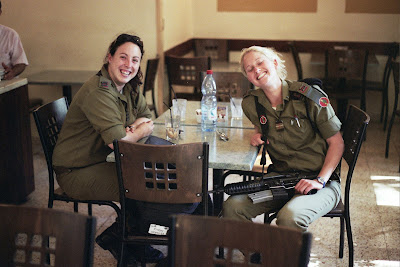 |
| Two IDF soldiers in a cafe, Old City in Jerusalem |
In the end, on my second trip to the West Bank I went solo, foregoing the guide services of Mr. Abu Hassam. I wanted to see the Wall near Bethlehem, where British graffiti artist Banksy had painted some good pieces. After taking my time exploring the wall, I walked to a security checkpoint to cross back into Israel.
Beep beep beep be—
"Step back. Come here." The woman's voice commanded over the loudspeaker. I looked around, trying to figure out where "here" was.
"Step back through the metal detector." I saw the small bulletproof glass window the border security guard was sitting behind.
"Put your camera through the x-ray machine." I had tried to carry it through with me.
"The film will get destroyed in the x-ray. It's special high speed film. Can I have it checked by hand?" I asked.
"It will be fine. Put it through the machine." I could tell by the tone of her voice she didn't want to hear someone talk back. Her role was to command. My role was to obey.
"X-rays ruin this type of film. Even 'film safe' x-rays."
"I said it will be fine. Put it through."
I didn't want to lose the pictures of graffiti I had just taken, nor a few shots of Jerusalem from earlier.
"Can I take the camera outside? I don't need to cross back into Israel right now. I'll go back to Bethlehem."
"No. Why don't you want the camera to be x-rayed?" Maybe she was hoping I would admit it contained a bomb.
"Because it will ruin the film."
"I said put it through the x-ray," she ordered.
"It's high speed film. The x-ray machine will destroy it."
"Put it through."
"The pictures will be ruined. Can someone check the camera manually?"
"Put it through."
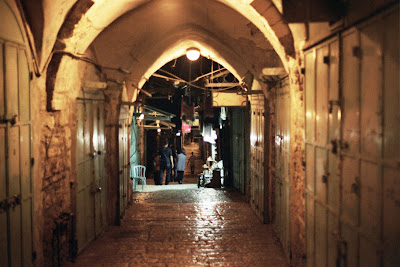 |
| Street in the Old City, Jerusalem |
She had left me no choice. I put the camera through the x-ray machine, walked through the metal detector, and collected it. In 10 short seconds she had erased my pictures.
"Stop," the voice came over the loudspeaker again. "Pick up the camera. Bring it back."
Despising her attitude, I obeyed.
"Put it through the x-ray again."
Was this a show of power just to be spiteful? I stared at the woman through the glass as I grabbed a tray, put the camera on it, and rolled it onto the conveyor belt. Back through the metal detector, I watched it emerge from the black box of the x-ray. I collected it along with my backpack and waited to be let out of the gated security area. 6 or 7 others were waiting too. The woman behind the glass was now talking on the phone. It looked like an enjoyable conversation, maybe to a friend. We stood there waiting for her to push the button which would open the gate for us to pass through and continue with our lives.
"That woman, she's a bitch," said a Palestinian student in front of me. He lived in Jerusalem and studied in Bethlehem, passing through this checkpoint almost every day. "Most of the others are OK. But her, always with the attitude."
After a minute she finished chatting, reached over, and pressed the button to release us. I walked out pissed off. Not so much at my destroyed film — I had previously taken pictures at another section of the wall on a different roll — as at the demeaning attitude the woman used with me. While many of the border security may be fine as the student had said, mine was a mild experience compared to some of the stories I had heard.
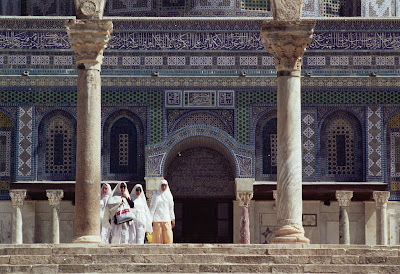 |
| Muslim women at the Dome of the Rock, Old City in Jerusalem |
Alisdair, a friend I travelled with in Israel, took a trip to the West Bank and found Ahdam, a taxi driver, who gave him a tour of several areas. Ahdam had studied and lived in Germany for many years before returning to Palestine due to the ailing health of his father. This is one of the stories Alisdair heard during the time they spent together:
Ahdam arrived at a security checkpoint one morning in his taxi. A man from border security walked up to his car and asked him what he did and where he was going.
"I'm a taxi driver, I'm going to pick up a fare," replied Ahdam.
"Ah, a taxi driver," said the border patrolman. "Then your time must be valuable."
"Yes it is. My time is very valuable," said Ahdam.
"OK. Just wait here a moment," said the patrolman and walked off.
Ahdam waited in his car. An hour later the patrolman returned.
"So is your time valuable?"
"Yes, my time is valuable. If I don't drive I don't make money," said Ahdam.
"Very good. Wait here," said the patrolman and walked off again.
Ahdam sat in his car. And waited. The patrolman returned once more after an hour.
"Your time — is it still valuable?" he asked.
"I told you it is. I'm a taxi driver."
"OK. Wait here please."
Again the patrolman walked away, leaving Ahdam in his car, unable to go anywhere. An hour passed by. The patrolman returned a third time, having made Ahdam wait 3 hours at the checkpoint.
"Now," said the patrolman, "do you still think your time is valuable?"
A pause. "No," replied Ahdam.
"Your time isn't valuable."
"My time isn't valuable."
"Your time is shit, isn't it?" said the patrolman.
"My time is shit," said Ahdam.
"OK, you can go," said the patrolman and waved him off with his hand.
Despite all of the above, I actually agree with those that argue the wall is necessary. People living in Israel have every right to stop themselves from being attacked and to lead a normal life. I have heard stories about working at a popular bar and losing a co-worker to a man who blew himself up at the entrance. About seeing a bus full of passengers explode, leaving a bloody wreckage but no survivors. The wall has stopped these attacks. It will be taken down when it's no longer needed, but today is not that day.
This is not to justify the way it is being built. Michel, the Palestinian journalist, claimed it is taking over 10% of Palestine's land (as defined by the Green Line) and 45% of its water supply. And those unlucky enough to have a shop or house lying in the path of the Wall not only have to stand aside as their buildings are demolished, they have to pay 20,000-30,000 shekels (US$4,700-7,000) towards the cost of the bulldozing. In these ways the wall cannot be considered purely defensive. It is adding fuel to a fire that doesn't need fanning.
These were some of my thoughts when I departed back to Amman. Which is another important point — I went to Israel and Palestine, I learnt a bit, and I was able to leave. Those who are born there have no choice. They start their lives on one side or the other and they are unavoidably bound to the conflict. If I want, I can choose to never think about it again. I have sympathy for those who can't.
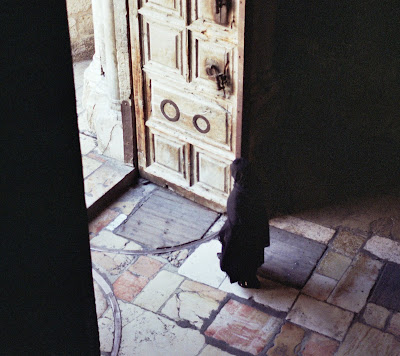 |
| Church, Jerusalem |
Disclaimer: Most quotes in this post are paraphrased. They capture the spirit of what was said, if not the exact words.

6 comments:
Very interesting post, Nige. Thanks for taking the time to write it. Out of interest, what happened to the film? Was any of it salvageable? People who go on power trips like that must be very miserable in their own life...
Some of it was salvageable, so it wasn't as bad as I thought at the time. (Based on what I had read on photo sites I expected the pictures to be wiped out.) Luckily the shots I took weren't particularly good anyway.
Most amazing write up, Nige. Many of the photos brought back memeories of when I was in Israel forty years ago.
I am too emotional to say anything worthwhile.
If the situation was bad when I lived there, how much worse has the hatred, fear and suspicion become between Arabs and Israelis, with no solution in sight..
How sad.
Take Care.
P.S. I'm referring to your blog entires for the 29th and 30th of June.
If the situation was bad when I lived there, how much worse has the hatred, fear and suspicion become between Arabs and Israelis, with no solution in sight.
I have hope things will get better. I really don't have the perspective of history, but some of the people I talked to felt that people know how the conflict will end - borders will be set on the Green Line. It's a question of how to get there. The fact that Israel pulled settlers out of the Gaza Strip shows that attitudes do change.
"The fact that Israel pulled settlers out of the Gaza Strip shows that attitudes do change."
Nige, I'll try and feel as optimistic as you, but with a little bit of history lining my diminishing grey cells, I can't help but feel that that was just a token offer of good will to pacify certain powers that be.
Both sides have such a long way to go that more dramatic steps than that will be necessary to make any difference.
As you say, it's a question of how to get to accepting borders on the Green Line. That is a sixty million dollar puzzle, -- but like the people who live there, we must never give up believing that a solutiopn is possible.
Post a Comment